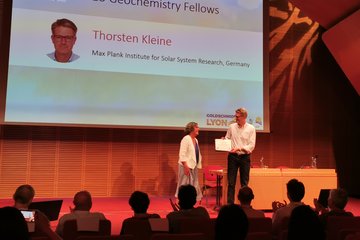Alle Typen
101.
Vortrag
Investigating physical and chemical mechanisms in planetary atmospheres and their impacts on the observables. Europlanet Science Congress 2020, online (2020)
102.
Vortrag
Observing atmospheric HCN on Titan from space and ground-based observatories: an inter-comparison study from Herschel, APEX and IRAM 30m telescopes. Europlanet Science Congress 2020, online (2020)
103.
Vortrag
Studying physics and chemistry in atmospheres of hot Jupiters from future ground-based and space facilities. Europlanet Science Congress 2020, online (2020)
104.
Vortrag
Discussion on Astronomy. Online Live outreach Talk, organized by the Sociedad Planetaria Albireo de Ciencias Espaciales (SPACE) (2020)
105.
Vortrag
Entre el Sol y los Gigantes. Online outreach talk in “Charlas en el Café", Planetario de Medellín, Medellín, Columbia (2020)
106.
Vortrag
Remote sensing of exoplanetary atmospheres with ground-based high resolution near-infrared spectroscopy. EPSC-DPS Joint Meeting 2019, Geneva, Switzerland (2019)
107.
Vortrag
Advances in characterizing exoplanetary atmospheres and interiors. SPP 1992 All-hands-on-deck Meeting , Hamburg, Germany (2019)
108.
Vortrag
Remote sensing of exoplanetary atmospheres at low and high spectral resolutions. SPP 1992 All-hands-on-deck Meeting , Hamburg, Germany (2019)
109.
Vortrag
Solar System Object Observations at Far-infrared and Sub-millimetre Wavelengths: The Herschel/Spire 194-671 mm Data. 16th Annual Meeting, Asia Oceania Geosciences Society (AOGS), Singapore (2019)
110.
Vortrag
HCN Submillimetre Remote Sensing of Titan's Atmosphere with the APEX and IRAM 30m Telescopes. 16th Annual Meeting, Asia Oceania Geosciences Society (AOGS), Singapore (2019)
111.
Vortrag
Tracing the Gas Composition of Titan´s atmosphere with Herschel and ground-based telescopes. Herschel Ten Years After Launch: Science and Celebration, Villafranca del Castillo, Madrid, Spain (2019)
112.
Vortrag
Investigating planetary atmospheres in our own Solar System and beyond: Advances and Perspectives . Symposium Remote Sensing of Planetary Atmospheres. Deutsche Physikalische Gesellschaft (DPG) Spring Meeting, München, Germany (2019)
113.
Vortrag
Spectral Scan and Line Catalogue of the Martian Atmosphere from Herschel-HIFI observations. European Planetary Science Congress 2018 , Berlin, Germany (2018)
114.
Vortrag
Creating music from astronomical/planetary data: Herschel/PACS data sonification of Haumea. European Planetary Science Congress 2018 , Berlin, Germany (2018)
115.
Vortrag
The Herschel Catalogue of Solar System Object Observation. Asia Oceania Geosciences Society (AOGS) 15th Annual Meeting , Honolulu, Hawaii (2018)
116.
Vortrag
Spectral Scan and Line Catalogue of the Martian Atmosphere from Herschel-HIFI observations. Asia Oceania Geosciences Society (AOGS) 15th Annual Meeting , Honolulu, Hawaii (2018)
117.
Vortrag
The Key Physical-chemical Processes determining the Composition and Temperature of (exo)planetary Atmospheres. Exoplanet Diversity, DFG SPP 1992 Kick-Off Meeting, Berlin (2018)
118.
Vortrag
Tracing the gas composition of Titan's atmosphere with Herschel: Advances and discoveries. Ginzburg Centennial Conference on Physics, Moscow, Russia (2017)
119.
Vortrag
Tracing the Composition of Titan stratosphere at Far-infrared and Sub-millimetre waves: A successful case of study of cross-comparisons between space and ground-based platforms. 14th Annual Meeting of the Asia Oceania Geosciences Society (AOGS), Singapore (2017)
120.
Vortrag
Isotopic Ratios in Titan from the Herschel Space Observatory: 12C/13C in HCN and CO, 14N/15N in HCN, and 16O/18O in CO. Asia Oceania Geosciences Society (AOGS) 13th Annual Meeting, Beijing, China (2016)











